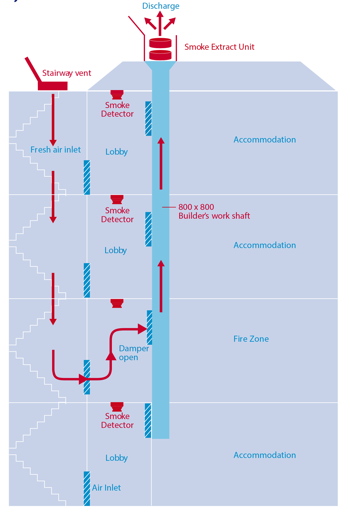Controlling the perils of smoke

Fires in buildings can be big news, especially if people die. Smoke control systems can save lives — but only if they are functioning correctly, as Olly Lucas of SCS Group explains.
When a fire breaks out in a building, every second counts when it comes to people getting out safely. If you are the person responsible for a building, you need to be sure that your safety systems work properly — because lives could be put at risk if they don’t.
Smoke-control systems are critical to ensuring the safety of individuals in the event of a fire. Smoke build-up, if not ventilated correctly, can quickly overcome an individual long before the fire itself becomes an immediate risk.
In the event of a fire, smoke-control systems limit and control the movement of smoke throughout a building. These systems are designed to both maintain clear escape routes for people in the building and protect firefighters entering the building. It is thus vital that smoke-control systems can be relied upon — and that means making sure they are maintained and working correctly.
The most common type of smoke-control system is the ‘smoke shaft’ system. It uses a builder’s work shaft to ventilate smoke away from enclosed spaces or space where it would be unfeasible to use automatically opening ventilators. It can be naturally or mechanically ventilated, depending on the flow rate required.
To work efficiently, while also providing day-to-day extraction of heat from common areas, modern installations utilise a purpose-designed automatic ventilation software program that ensures fail-safe operation in fire conditions.
The Regulatory (Fire Safety) Reform Order (RRO) 2005 stipulates that the responsible person must ensure that the premises, facilities, equipment and any devices for use by or for the protection of firefighters and relevant persons are subject to a suitable system of maintenance and are maintained in an efficient state, in efficient working order and in good repair. It is an offence to fail to comply where that failure places one or more relevant persons at risk of death or serious injury in the case of fire.
The maintenance requirements for natural (vents) and powered (fans) smoke control systems are set out in BS EN 12101 and BS 9999. These standards stipulate that such life-critical equipment shall be included in the building-services maintenance schedule. They also set out the frequency of tests and what should be checked. Weekly and monthly checks will typically be carried out by general maintenance personnel for a building who have received basic hands-on training from the manufacturer/installer of the system.
However, the reality is that weekly and monthly checks are often overlooked. This may be because the importance of frequent life-safety system checks is not fully understood. The service provider of the smoke-control system needs to be actively encouraging short-term checks of the system, offering training to site personnel and a log book so all checks can be recorded and monitored. SCS Group has a maintenance logsheet available to download.*
BS EN 12101 states in addition to weekly and monthly tests, the entire system should be tested annually as a minimum. Where weekly or monthly checks are not carried out, the inclusion of a 6-monthly function check in addition to the annual service by the specialist service provider becomes more important.
As a manufacturer and installer of smoke-control systems, SCS Group stipulates a rigorous maintenance procedure that should be undertaken annually as a minimum. Due to the complexity of modern smoke-control systems, ever-changing climatic conditions within the UK and absence of weekly/monthly testing, we strongly recommend a 6-monthly function check is undertaken in addition to the annual service.

Smoke-control systems should only be maintained by a competent person with specialist knowledge of smoke-control systems, training on the system installed, adequate access to spares and sufficient information regarding the system.
In addition to having experience and training of smoke-control systems, the service engineer needs to have an industry recognised level 3 electrical qualification. Training in PLC systems is essential to enable an engineer to interrogate, repair and update the automated software programs.
When selecting a contractor, we advise you to choose a member of the Smoke Control Association (SCA).
SCS Group believes that maintenance of smoke-control systems is being targeted by some companies that do not have a full understanding of such systems, are not taking the time necessary to undertake critical checks and are overlooking fundamental issues on related systems that are fundamental to the triggering of the smoke control systems in the event of a fire.
Where full correct maintenance is not being carried out, the short-term cost of maintaining a system is likely to be less expensive — but if a maintenance quote seems too good to be true, it probably is.
If you are the responsible person or company for a building you should understand that if the smoke-control system fails in your building when you need it most, lives could be lost and you could face prosecution.
Olly Lucas is service manager with SCS Group.
*http://groupscs.co.uk/services/ maintenance/







